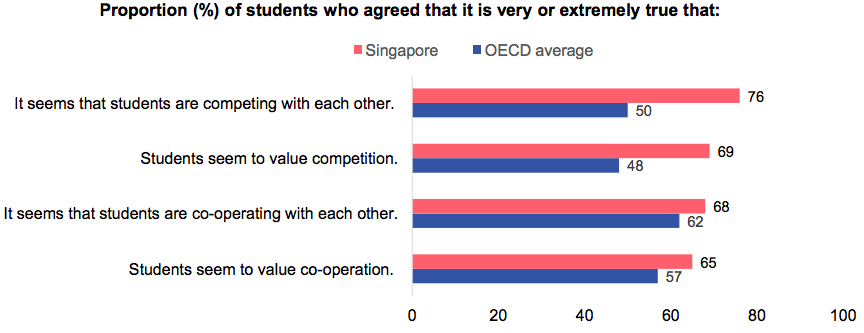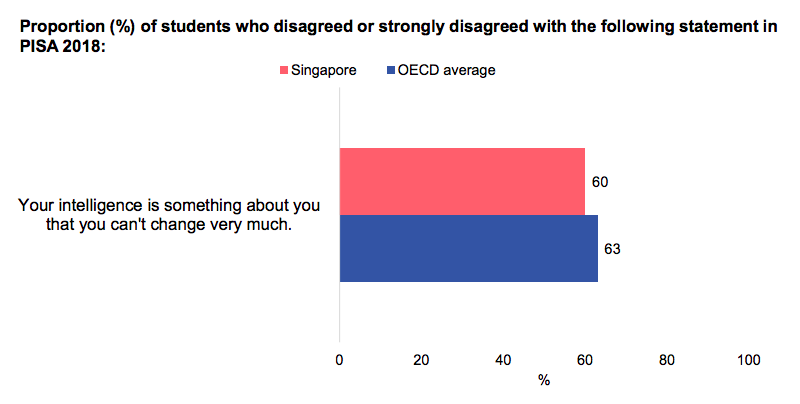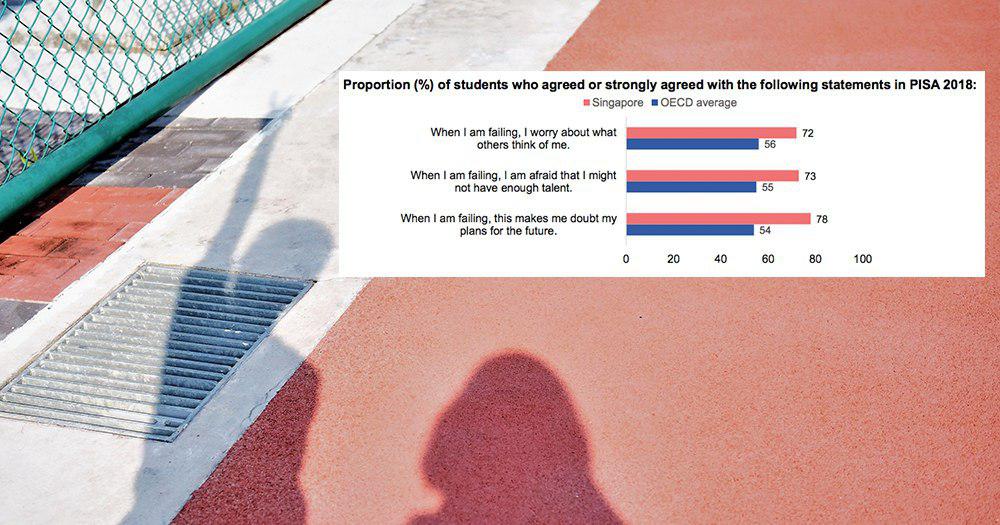More than 70 per cent of 15-year-old students in Singapore are afraid of failing, according to 2018 results from the triennial Program for International Student Assessment (PISA).
In addition, only 60 per cent of them believe their abilities and talent can grow through effort and practice, which is lower than the Organisation for Economic Cooperation and Development (OECD) average of 63 per cent.
In total, 6,676 students from 153 public secondary schools and 13 randomly sampled private schools in Singapore participated in PISA 2018, alongside 15-year-olds from a total of 79 education systems.
More than 70 per cent of students worried, fearful about impact of failure
72 per cent of respondents from Singapore agreed or strongly agreed when asked if they are worried about what others think of them when they fail, markedly higher than the 56 per cent average across the OECD participants.
73 per cent of students in Singapore also agreed or strongly agreed that they are afraid that they might not have enough talent when they are failing — showing an even larger margin compared to the 55 per cent average scored across the OECD countries' students.
But most of all, 78 per cent of Singapore respondents said they would doubt their plans for the future when they fail. This sentiment distinguished Singapore students the most widely from the 54 per cent OECD average.
 Image via MOE
Image via MOE
According to the Ministry of Education (MOE), most of the 15-year-old students who participated in PISA 2018 were in Secondary 4.
As they would be sitting for the O/N-Level exams at the end of that year, their fears could have stemmed from the desire to do well in the national examinations.
MOE has also recognised that while some degree of a fear of failure might motivate one to do well, an excessive fear of failure may be disabling.
Student attitudes towards competition and cooperation
Meanwhile, when it came to student attitudes towards learning, more than 60 per cent of Singapore students perceived a higher sense of competition and at the same time, cooperation, among their peers in school.
76 per cent of students in Singapore said they sensed that students here are competing with one another, showing the highest disparity with the 50 per cent finding across the OECD average.
69 per cent of students in Singapore said also that students seem to value competition, compared with the OECD average of 48 per cent.
At the same time, though, 68 per cent of students in Singapore also agreed that students are cooperating with one another, versus the OECD average of 62 per cent.
 Image via MOE
Image via MOE
The PISA study did observe that when cooperative and competitive behaviours are brought together, the performance and enjoyment of participants could be higher than in a purely cooperative environment.
However, MOE has likewise acknowledged that while a certain degree of competition might motivate one to excel, excessive competition may be toxic.
Fewer students in S'pore believe they can grow their talent, intelligence and abilities compared to OECD average
First coined by Dr. Carol Dweck, a renowned psychologist, a growth mindset refers to the belief that a person’s talents, intelligence and abilities can and will grow through practice, effort and dedication.
According to the study's findings, the proportion of Singapore students who report having such a growth mindset was higher in Singapore than most other top-performing Asian systems.
However, it was slightly lower than the overall OECD average.
For instance, 60 per cent of Singapore students said intelligence was something that can be changed, but this was lower than the OECD average of 63 per cent.
 Top image via MOE
Top image via MOE
Steps MOE is taking to tackle these problems
In order to improve these statistics, MOE has been making changes to the education system to reduce an over-emphasis on grades, and therefore excessive competition.
Some changes include the new PSLE scoring system, full subject-based banding, and phasing out of academic streams.
They have also stated that they will continue to help students develop a growth mindset and the resilience to bounce back from failure, in addition to providing multiple pathways for students to pursue their passions.
A growth mindset, in particular, is especially important as it will motivate students to continue learning throughout life.
Top photo adapted via MOE, Abigail Low on Unsplash
If you like what you read, follow us on Facebook, Instagram, Twitter and Telegram to get the latest updates.
